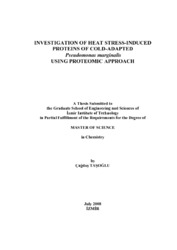Please use this identifier to cite or link to this item:
https://hdl.handle.net/11147/3946Full metadata record
| DC Field | Value | Language |
|---|---|---|
| dc.contributor.advisor | Yalçın, Talat | - |
| dc.contributor.author | Taşoğlu, Çağdaş | - |
| dc.date.accessioned | 2014-07-22T13:52:48Z | - |
| dc.date.available | 2014-07-22T13:52:48Z | - |
| dc.date.issued | 2008 | - |
| dc.identifier.uri | http://hdl.handle.net/11147/3946 | - |
| dc.description | Thesis (Master)--İzmir Institute of Technology, Chemistry, İzmir, 2008 | en_US |
| dc.description | Includes bibliographical references (leaves: 68-78) | en_US |
| dc.description | Text in English; Abstract: Turkish and English | en_US |
| dc.description | x, 81 leaves | en_US |
| dc.description.abstract | Temperature alteration is known as a common environmental stress condition which all living organisms encounter and response by producing evolutionary wellconserved specific proteins called heat stress or heat shock proteins in the cell in order to adapt and survive. In the current study, the induction of heat stress proteins in a coldadapted bacterial strain of Pseudomonas marginalis cells grown under heat stress was investigated by proteomic approach. Five different temperatures, 5, 10, 15, 24, and 30C, were examined for the purpose of determining the optimum growth temperature for the bacterium. Consequently, 15°C was observed as optimum temperature for growth while 30C was established as heat stress temperature. Total proteins from Pseudomonas marginalis cells in the late exponential phase of growth at these two temperatures were extracted and separated by two-dimensional polyacrylamide gel electrophoresis. Totally 1391 protein spots were visualized for 15C and 1384 protein spots for 30C. After comparing with 15C, 13 protein spots that were differentially expressed in the cells exposed to heat stress (30C) were cut from the gel and fragmented into their peptides by in-gel digestion method. Finally, these proteins were identified by liquid chromatography-tandem mass spectrometry (LC-MS/MS) and database searching. Among them, ribosome recycling factor, universal stress protein family and chaperonin GroEL were established as direct sensors of heat stress. As a result, the genes encoding these two heat stress proteins can be isolated and cloned into any other useful microorganism such as bacteria used for detoxification of industrial waste or used in bioremediation but not capable of surviving at high temperatures so that they can be efficient at those temperatures, too. | en_US |
| dc.language.iso | en | en_US |
| dc.publisher | Izmir Institute of Technology | en_US |
| dc.rights | info:eu-repo/semantics/openAccess | en_US |
| dc.subject.lcc | QD96.M3 T199 2008 | en |
| dc.subject.lcsh | Mass spectrometr | en |
| dc.subject.lcsh | Heat shock proteins | en |
| dc.subject.lcsh | Proteins | en |
| dc.subject.lcsh | Proteomics--Methodology | en |
| dc.subject.lcsh | Pseudomonas | en |
| dc.title | Investigation of Heat Stress-Induced Proteins of Cold-Adapted Pseudomonas Marginals Using Proteomic Approach | en_US |
| dc.type | Master Thesis | en_US |
| dc.institutionauthor | Taşoğlu, Çağdaş | - |
| dc.department | Thesis (Master)--İzmir Institute of Technology, Chemistry | en_US |
| dc.relation.publicationcategory | Tez | en_US |
| dc.identifier.wosquality | N/A | - |
| dc.identifier.scopusquality | N/A | - |
| item.openairecristype | http://purl.org/coar/resource_type/c_18cf | - |
| item.languageiso639-1 | en | - |
| item.openairetype | Master Thesis | - |
| item.grantfulltext | open | - |
| item.fulltext | With Fulltext | - |
| item.cerifentitytype | Publications | - |
| Appears in Collections: | Master Degree / Yüksek Lisans Tezleri | |
Files in This Item:
| File | Description | Size | Format | |
|---|---|---|---|---|
| T000688.pdf | MasterThesis | 1.67 MB | Adobe PDF |  View/Open |
CORE Recommender
Page view(s)
130
checked on Mar 31, 2025
Download(s)
80
checked on Mar 31, 2025
Google ScholarTM
Check
Items in GCRIS Repository are protected by copyright, with all rights reserved, unless otherwise indicated.